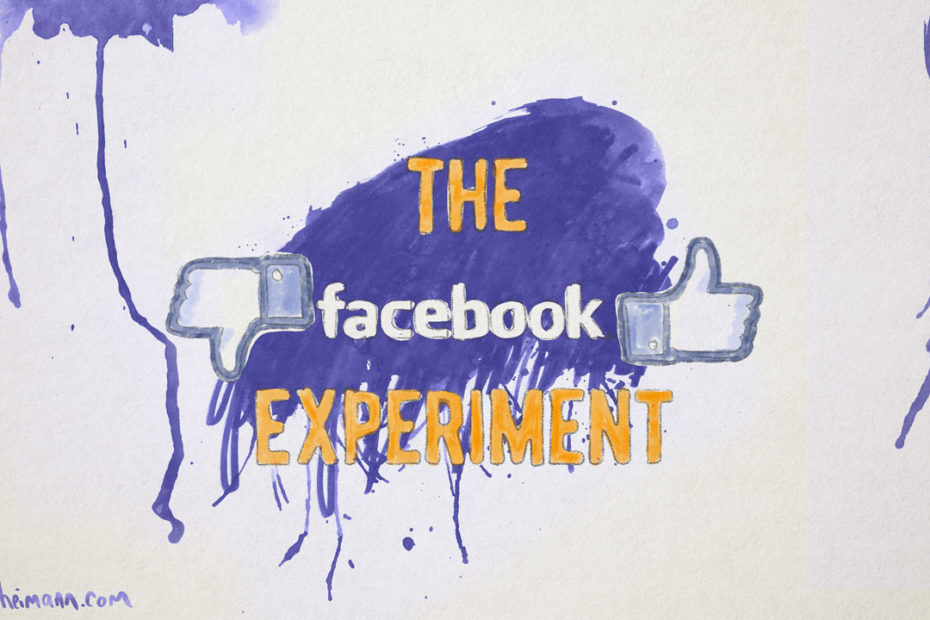Do you know about the Facebook experiment?
Facebook is amazing. It has allowed me to stay up-to-date with friends and relatives across the country and on the other side of the world with a simple “drag of my finger.” My old roommate had a baby, my friend from 7th grade is moving back into town, and a guy that I don’t recognize just had pulled pork for lunch. Okay, some things on social media are obviously more interesting than others.
Whether you realize this or not, you don’t see every post from every Facebook friend. Facebook has a complicated algorithm that shows you the post that it thinks you would most like to see (Instagram might adopt this soon). If you frequently click on your buddy’s pictures, comment on your sister’s dumb posts, or like Uncle Leroy’s cat videos, Facebook is probably going to pop those in your timeline the next time you login. But if you always ignore Chris from math class, you probably won’t see any of his future posts.
In 2012 Facebook did a little experiment. They took about 700,000 people and divided them into two groups. For the first group, Facebook analyzed posts from their friends and removed anything that seemed to have negative words in it. “I hate all this snow, can’t wait for summer #noidontwanttobuildasnowmananna” probably didn’t make it into their timelines.
The second group was the opposite. Any status updates with positive words in it were eliminated from their feed. So, “Pizza and Jesus at youth group?!! Yes please!! Can’t wait to get my prayer on. My life is amazing! [smile emoticon]” was never to be seen.
So the first group got an abnormal amount of positive posts, and the second group was left with mostly negative updates. What happens next will blow your mind! (Doesn’t that make you want to keep reading?!)
As Mark Zuckerburg (the founder of Facebook) sat back and ate… whatever billionaires eat these days, the results of the experiment unfolded. The people that received mostly negative posts were much more likely to start posting negative posts themselves. And, as you might be able to predict, the Facebook users that were seeing mostly positive posts were starting to post more positive updates.
Long story short: People were being influenced by the status updates of their friends.
[wolf_button target=”blank” url=”http://twitter.com/home/?status=People were being influenced by the status updates of their friends. – @KyleHeimann https://www.kyleheimann.com/influence” color=”yellow” type=”flat” size=”big” target=”_blank” tagline=”–click to tweet this!–“]People were being influenced by the status updates of their friends.[/wolf_button]
We might think that we aren’t influenced by the things around us. But the reality is that we are. We think that we are beautiful unique snowflakes that aren’t influenced by the weather around us, but if it gets hot, Olaf, you’re going to melt (sorry, I promise that will be the last Frozen reference).
Our friends, family, magazines, books, TV, movies, music, and yes, social media change us. You can follow Kanye or the Pope on Twitter and get two different perspectives on life. I’m not saying social media is bad, or that listening to a secular song is wrong, or even that hanging out with an atheist is going to send you to hell. Of course not.
But we should be careful. It’s important that we strive to have people around us that are positive influences in our lives, especially on social media. So follow the Pope on Instagram, or find your youth minister on Snapchat because the more we can reduce our negative influences and increase our positive influences, the better off we will be.
[wolf_button target=”blank” url=”http://twitter.com/home/?status=Under the influence of . . . Facebook? Twitter? Instagram? – @KyleHeimann https://www.kyleheimann.com/influence” color=”yellow” type=”flat” size=”big” target=”_blank” tagline=”–click to tweet this!–“]Under the influence of . . . Facebook? Twitter? Instagram?[/wolf_button]
So choose who you let influence your social media timeline wisely. Oh, and if you had a really bad week in 2012, now you know why.
[wolf_button target=”blank” url=”http://twitter.com/home/?status=Check out this blog by @KyleHeimann about how a Facebook experiment affected users. https://www.kyleheimann.com/influence” color=”yellow” type=”flat” size=”big” target=”_blank” tagline=”–click to tweet this!–“]Check out this blog by @KyleHeimann about how a Facebook experiment affected users.[/wolf_button]
